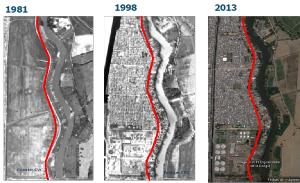New Reading space projects to boost global sustainable development
19 August 2020

The UK Space Agency has today (Tuesday 18 August) announced new funding for Reading-based researchers to support farmers in Ghana to protect their crops and help relocate people displaced by natural disasters in Columbia.
Scientists in Reading are working on the two new projects. The first, known as Crop Yield Decision Support, led by Assimila Ltd, will use information on maize yields in Ghana to provide information used by farmers, supply chain actors, governments and international organisations to inform markets and enhance long term food security and past yields to help farmers benchmark and improve productivity.
The second project, called Re-settlement Information and Observing System (RIOS) led by Institute for Environmental Analytics, at the University of Reading, will use Earth Observation (EO) satellites to provide a monitoring service for managing informal settlements in Colombia. The project will help mitigate against the danger of loss of life arising from natural disasters in settlement areas and to support the re-housing of displaced people.
Dr Jon Styles, Director of Assimila Ltd, based in Reading said: “Assimila is delighted to be working with our partners Farmerline and CABI to deliver practical information on crop yields that will help farmers, buyers, processors and governments to manage food production more effectively. Variability on crop performance over time is being exacerbated by changes in climate that are making yields less predictable.
“By combining satellite and weather information with cutting edge models we will help reduce the uncertainty in what the next harvest will bring, improving farmers’ livelihoods and improving food security.”
Dr Maria Noguer, Climate Programme Manager at the Institute for Environmental Analytics, said: “The IEA is delighted to win this contract from the UK Space Agency International Partnership Programme. Once again, we are able to use our innovative environmental data analytics skills to address a growing real-world challenge in the face of our changing climate, to the benefit of society.
"We will be working with the Colombian Government, through Fondo Adaptación, to protect the lives of people living in informal settlements along the Cauca River where the dam is deteriorating and their lives are at risk from severe flooding. Our successful track record in working in partnership with governments around the world, as well as our expertise in pioneering Earth observation data solutions, has been recognised by this funding.”
“These 10 new projects have the potential to provide solutions to the world’s biggest development problems" - Amanda Solloway, UK Science Minister
The schemes are among 10 new cutting-edge projects involving UK companies helping tackle global development problems – from the spread of malaria to human trafficking. The UK Space Agency’s International Partnership Programme (IPP) has provided £3.4 million funding in total, including nearly £550,000 for the two Reading-based projects.
Science Minister Amanda Solloway said: "From flooding and climate change, around the world people continue to be affected by crises that are having a profound impact on their countries’ economies and their lives.
“These 10 new projects have the potential to provide solutions to the world’s biggest development problems by using the latest and most high-tech space technologies such as satellites, and help improve millions of people’s lives in developing countries."
This announcement comes as a new report is published, evaluating the impact of existing IPP projects.
The report reveals that since launching IPP in 2016, satellite training has been delivered to over 300 health workers across three states of Nigeria, saving an estimated 30 lives; and a marine pollution application has prevented two oil spills from reaching the coastline, saving an estimated £3 million in clean-up costs and significantly reducing the impact on the environment and its wildlife.
The report also shows that space-based solutions continue to be 12 times more cost-effective at delivering sustainable forestry, seven times more economical in supporting agriculture, and twice as resourceful for ensuring disaster resilience, than ground-based alternatives.
Liz Cox, IPP’s Head of International Relations at the UK Space Agency, said: "The compelling results of the previous projects cement the case for investment in space for sustainable development. IPP is not only demonstrating the value of satellite solutions and improving the lives of people on the ground in developing countries but also facilitating effective alliances between the United Kingdom and international organisations. It’s a ‘win-win’ and an exciting moment in the Programme."
IPP, a £30 million a year programme, has already grant-funded 33 projects in 44 countries across Africa, Asia-Pacific and Latin America and built partnerships between 120 space-enabled data organisations and 147 international partners in developing countries. These projects are designed to meet UN Sustainable Development Goals (UN SDGs) such as support for precision agriculture, early warning systems for disaster prediction, maritime safety, and disease forecasting.
The Programme has so far generated £279 million in Gross Value Added for the UK economy and supports 3,300 jobs globally. The UK economy gains more than £2.50 for every £1 invested in IPP projects.
The UK space sector is an economic success story, growing by over 60% since 2010. The sector already supports £300 billion of UK economic activity through the use of satellite services, and the government has established a new National Space Council to consider how space policy can enhance the country’s prosperity and place in the world, as well as our security interests.
Image caption: Aerial photographs of informal settlements on the Cauca River, on the outskirts of the Colombian city of Cali, show how they have encroached dangerously close to the flood-protection dam (red line) along the riverbank since the 1980s. Source: Corporación Autónoma Regional del Valle del Cauca (CVC) - Fondo Adaptación, 2014.
